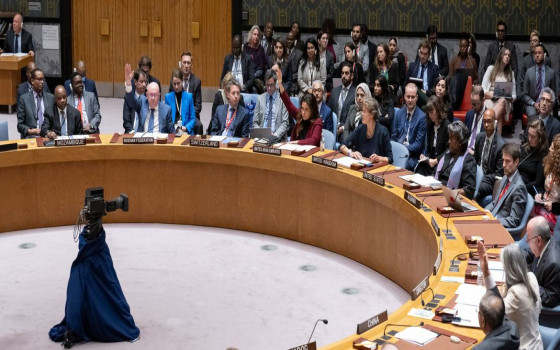
Positive reactions in Arab and Islamic countries to the UN resolution...and the Secretary-General describes Islamophobia as a “plague”

- Europe and Arabs
- Sunday , 17 March 2024 14:38 PM GMT
Capitals: Agencies
Arab and Islamic countries continued to express their welcome to the United Nations General Assembly’s adoption of a resolution on measures to combat Islamophobia and the appointment of a United Nations special envoy concerned with combating Islamophobia.
In a statement issued by the Kuwaiti Ministry of Foreign Affairs, the State of Kuwait renewed its call to spread international awareness to confront attempts to insult the true Islamic religion and to support efforts aimed at establishing peaceful coexistence among peoples based on the values of justice, tolerance and respect for human rights and not to allow the principle of freedoms to be exploited as an excuse to insult the Islamic religion and all other religions. .
For his part, the Secretary-General of the Gulf Cooperation Council, Jassem Al-Budaiwi, stressed that the GCC countries support all UN and international resolutions and efforts that condemn violence, hatred, incitement and extremism against all religions. He also urged all countries to adopt national laws and policies to prevent and combat religious hatred and hold its perpetrators accountable. According to a statement issued by the Council.
The Bahraini Ministry of Foreign Affairs expressed the Kingdom’s welcome to the United Nations General Assembly’s adoption of a resolution on “measures to combat Islamophobia.” The Saudi Ministry of Foreign Affairs also expressed the Kingdom’s welcome to the United Nations General Assembly’s adoption of a resolution on “measures to combat Islamophobia,” and the appointment of a special United Nations envoy concerned with By combating “Islamophobia”.
On Friday, the United Nations General Assembly adopted a resolution entitled: “Measures to combat Islamophobia.” This came during a meeting on the occasion of the International Day to Combat Hatred of Islam, or "Islamophobia." 115 countries voted in favor of the draft resolution submitted by Pakistan on behalf of the Organization of Islamic Cooperation, while 44 countries abstained from voting. No country voted against the resolution.
The resolution calls, among other things, for the appointment of a UN special envoy to combat Islamophobia. Before the vote, Pakistan's Permanent Representative to the UN, Ambassador Munir Akram, reviewed the draft resolution which he said follows the first resolution under which the International Day to Combat Islamophobia was established, two years ago.
The resolution condemns any call for religious hatred and incitement to discrimination, hostility, or violence against Muslims, “as evidenced by the increasing incidents of desecration of their holy book and attacks targeting mosques, sites, and shrines.” In its resolution, the General Assembly calls on Member States to take the necessary measures to combat religious intolerance, stereotypes, negativity, hatred, and incitement and practice of violence against Muslims, and to prohibit, by law, incitement and practice of violence on the basis of religion or belief.
The General Assembly adopts a resolution on combating Islamophobia.
After the member states concluded their deliberations on the resolution, the Secretary-General of the United Nations, António Guterres, spoke, saying that today’s event highlights the malicious epidemic - Islamophobia - which represents a complete denial and ignorance of Islam and Muslims and their undeniable contributions.
He added: “Around the world, we see a rising tide of hatred and intolerance against Muslims. This can come in many forms. Structural and systemic discrimination. Social and economic exclusion. Unequal immigration policies. Unwarranted surveillance and profiling. Restrictions on access to citizenship, education and employment. And justice.”
The Secretary-General cautioned that these and other institutional obstacles violate our shared commitment to human rights and dignity. It also “perpetuates a vicious cycle of exclusion, poverty and deprivation that reverberates across generations. At the same time, divisive and misleading rhetoric spreads stereotypes, stigmatizes communities, and creates an environment of misunderstanding and suspicion.”
The Secretary-General noted that all of this could lead to an increase in harassment and even outright violence against Muslims – of which increasing accounts are being reported by civil society groups in countries around the world.
He said some are "shamefully" exploiting anti-Muslim hatred and exclusionary policies for political gain. He added: "We must call things by their proper names. Simply put, all of this is hatred." The Secretary-General noted that "hatred of one group fuels hatred of another. Hatred normalizes hatred. It destroys the fabric of our societies. It undermines equality, understanding and respect for human rights, on which a peaceful future and world depend."
The Secretary-General stressed that we cannot stand by while hatred and intolerance spread, noting that today’s event reminds us that we all have a responsibility to confront and eradicate the scourge of intolerance against Muslims.
The Secretary-General said that for approximately two billion Muslims around the world, Islam is the pillar of faith and worship that unites people in every corner of the globe. "We must remember that it is also one of the pillars of our common history." The Secretary-General highlighted the significant contributions made by Muslim scholars to culture, philosophy and science, noting that Muslims come from all countries, cultures and walks of life. “They represent the wonderful diversity of the human family.”
In the spirit of Ramadan, the Secretary-General renewed the call to silence the guns in Gaza and Sudan. He called on all political, religious and community leaders to join his call, noting that the time for peace has come.
“The worst manifestation of Islamophobia”












No Comments Found